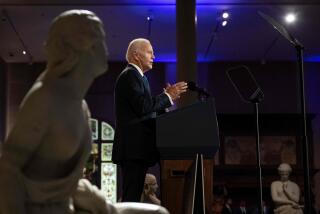Yes, Go to Moscow, Take the Heat : Clinton shouldn’t snub VE Day ceremony
- Share via
Not for the first time in his dealings with Russia, President Clinton confronts a dilemma.
He has been invited to Moscow in May to commemorate the 50th anniversary of the victory by the Allied powers over Nazi Germany, an occasion of major significance to Russians. But he has not yet accepted and there have been hints from within the Administration that in the end he will send his regrets.
Anthony Lake, Clinton’s national security adviser, says that the decision about whether to go is “complicated,” that the President has a busy domestic schedule, that the fighting in Chechnya and other developments in Russia all must be considered. In short, and also not for the first time, Clinton is having a terrible time making up his mind.
THE YELTSIN LINK: A further consideration not mentioned by Lake but clearly being taken into account is how critics of the Administration’s Russia policy would react if the President went to Moscow, where, unavoidably, he would share the limelight with President Boris N. Yeltsin in recalling the wartime alliance and its moment of military triumph.
Yeltsin’s stock has sunk to a new low in Washington, especially among Republicans, who are stepping up their attacks on Clinton, accusing him of an excessive toleration of the Russian president’s erratic and--as in Chechnya--sometimes brutal policies. Senate Majority Leader Bob Dole, in the latest GOP blast, accuses Clinton of “defending, denying and rationalizing” the policies of a government that in a number of sensitive international areas shows signs of acting in ways antithetical to American interests.
Weighing all this, Clinton should nonetheless plan now for a Moscow trip to mark the May 8 anniversary of the end of World War II in Europe.
He should do so to acknowledge formally what decades of Cold War politics largely prevented American leaders from talking openly about: That Russia--with 26 million dead, the majority of them civilians--suffered greater losses and destruction than any other country in the war. That without the sacrifices of the Red Army, Hitler’s forces on the European continent could not have been beaten, and Western Europe in consequence could not have been liberated. That Russians, however odious, cruel and cynical their government at the time was, contributed mightily to a victory that saved civilization from what Winston Churchill rightly called a new Dark Age.
A WORTHY SALUTE: Clinton should go to Moscow not to embrace Yeltsin or to make speeches extolling his wisdom and leadership. He should go to salute the wartime courage and sacrifices of the Russian people and to honor the often difficult alliance of disparates that achieved victory over barbarism.
For all that went before and for all that followed, the defeat of Nazism 50 years ago is compellingly a time to remember and to celebrate. No one knows what the future of U.S.-Russia relations may hold. But for almost four years the two countries were allies in a great cause. The President should be in Moscow to exalt that memory.
More to Read
Get the L.A. Times Politics newsletter
Deeply reported insights into legislation, politics and policy from Sacramento, Washington and beyond. In your inbox twice per week.
You may occasionally receive promotional content from the Los Angeles Times.










